- Home
- Melina Marchetta
The Piper's Son Page 2
The Piper's Son Read online
Page 2
“When’s he leaving?” Tom asks quietly, more out of the need for something to say than real interest.
“In the morning.”
“Go be with him, then. I’ll be fine.”
She fluffs up the pillow and throws it on the bed before looking up at him coldly.
“As if I’d leave you here with my little brother.”
Georgie makes a list. Her hand is steady as she writes and she nods and records. It’s part of the job description to stay neutral.
flannel shirt
metallic-blue nylon tracksuit pants
wool sweater
Adidas running shoes
gray parka
thin gold-plated chain with the name Sofya engraved on it
A Bosnian woman sits facing her. Georgie can see by the information on the form that they’re almost the same age, the woman maybe a year or two younger. The woman looks older, but so would Georgie if she had waved good-bye to her husband with the nylon tracksuit pants and her son with the Adidas shoes and her father with the wool sweater and her uncle with the gray parka and her cousin who loved a girl named Sofya and never saw them again. Sometimes the woman takes her hand and begins to weep, and Georgie lets her hold it while she continues to write. And when the woman lets go, Georgie wants to beg her to keep holding on. She wants to weep with her.
She’s not doing too well these days, although she’s only thrown up twice today. Earlier, while she was puking up morning sickness that doesn’t seem to discriminate between morning or afternoon, she made another list. She wants to stop making the lists, but she can’t. It’s become her little addiction, list making.
So she tries to call them rules. Ignore the first rule of not getting pregnant at forty-two because of the risks, because it’s not as though she planned this and it’s too late anyway. First real rule: no smoking. And no alcohol. Not even a glass of wine. Deformities, they say. No stone fruit. Not good for the baby’s intestines. And of course she’ll breast-feed. According to midwives, nothing beats the nutrients in breast milk because they keep the baby strong. Except if you live in Ireland, where ninety percent of them don’t breast-feed, so they must have strong immune systems to start with for some reason. She’ll sleep it on its tummy so it won’t die during the night from crib death. Or is the rule sleeping it on its back these days? And no pool. According to the stats, backyard drowning is the leading cause of injury for children under five, ahead of violence, poisonings, falls, burns, and motor-vehicle crashes. Of course her baby’s not sitting in the front seat because air bags can decapitate young children. She’ll vaccinate. She won’t give it peanuts. She’ll never leave it overnight at a friend’s because according to statistics ninety-five percent of all molestations happen at the hands of a family friend. There’ll be no Internet. Pedophiles are lurking everywhere. And she’ll holiday at home, thank you very much. No tsunamis here, or earthquakes.
And won’t he grow up to be the healthiest of young men, all because she kept him safe? Ready for the world. Ready to one day conquer it. To travel. Get on a train. Go to work. Get blown out of her life.
Maybe she should be having that glass of wine and cigarette after all.
The stone top step of his aunt’s front porch is cold under him, but Tom’s not budging. He’s got all the time in the world and nowhere else left to go. Across the road at the park, he can see people letting their dogs off the leash for that final run before they go home for dinner and lock out the world behind them.
He sees Georgie before she sees him. Coming up Percival Street from the station, and he can see it’s her ex, Sam, by her side. Georgie and Sam haven’t been together for seven years and they don’t look together now. Their bodies are stiff, their heads down. When they stop at the park across from him, Tom watches as Sam’s hand reaches out to Georgie for a moment, but he seems to stop himself and then she’s walking across the road toward the house and there’s that look Tom’s become used to in his life with his aunt. It’s the unconditional love that flashes across someone’s face before they remember the shit. Before they remember that their only nephew hasn’t made contact for months and that he’s a big prick. She can’t hide her joy for a moment, not Georgie, and Tom knows the instant she sees his stitches because she has a hand against her chest and the eyes give it all away. But that’s Georgie. Her pain was awful to watch the day they buried his uncle Joe, or whatever the hell you call it when you have a service with no body. Georgie’s grief was worse even than Nanni Grace’s, who refused to allow anyone to comfort her. “Take care of Bill,” Nanni Grace said over and over again because Tom’s step-pop was crying like nobody’s business. No one had ever seen Pop Bill cry. “Take care of Bill,” Nanni Grace said, “because he’s falling apart without his boy.”
When Georgie reaches him, he stands up and she gives him a hug with such force that he can’t let go. Nothing’s felt this good since that night two years ago when he was holding Tara Finke in his arms. And there it is again. A memory he’s kept at bay for so long and all he needs to do is fall into a table to bring it back.
“What happened?” Georgie asks, touching his face.
He doesn’t speak. Can’t.
“Tom, what happened?” she asks again.
“Can I stay here?”
“Are you in trouble with the police?”
He shakes his head. “It’s just stuff.”
The moment of unconditional love is over. All Tom’s life, Georgie has tried to be the cool aunt. The good cop to his father’s bad cop. The one who’d let him get away with anything. But she failed most times.
He stares at the front yard, the roses all pruned and the grass cut. He thinks of Sam walking her home and what that means. Back in the nineties, Georgie and Sam had bought this three-story Victorian because Sam was making a shitload of money and the property market hadn’t gone haywire yet. It was cheaper to buy on the Stanmore side rather than in Leichhardt because of the planes and flight path. When they broke up seven years ago, Georgie refused to move out and insisted on paying Sam rent. Sam moved onto the next street just to make things more complicated for all involved.
“Is he living here again?” Tom asks.
“Who?” she says firmly. “No. Who told you that?”
“Settle, petal,” he says, pissed off that he’s about to enter crazy family territory. “Give me the keys. You look like shit.” Suddenly he’s angry and he doesn’t know who he’s angry at.
“Bad day,” she says.
He nods. He knows bad days. Bad days take him completely by surprise. They make him not trust the good days because it’s likely something’s lurking twenty-four hours away.
Georgie sits on the step and he knows they’re not going through that door just yet.
“You sure you’re okay?” he asks.
Georgie works for some branch of the Red Cross where they track down people’s relatives who have disappeared in conflicts. Tom read somewhere that this year they were trying to identify bodies from mass graves that had been dug during the Bosnian War, more than ten years ago. That would mean Georgie spends most of her days interviewing survivors who immigrated here, recording what their dead or missing family members were wearing on the day they were last seen. Tom can’t think of a worse job for a Mackee.
“If you let me move in, I can pay my way,” he says. He can’t believe he’s twenty-one years old and begging his aunt to let him move in with her.
“Where are you working?” she asks, finally standing up, digging around for her house keys in a ridiculously oversize bag until she ends up chucking the contents of it onto the patio floor.
He hesitates for a moment. “I get money . . . from Centrelink.”
She stops searching and stares. She has what Tom’s mother calls classic looks, same as his little sister and Nanni Grace. Like those gorgeous actresses out of a 1940s war film with wavy dark hair, red lipstick, and what Tom’s mum called alabaster skin. If his little sister wants to know what she’ll look like at
forty-two and sixty-three, she just has to look at Georgie and Nanni Grace. It’s all in their eyes. A dark-gray mass of bullshit detectors, with a bit of meanness thrown in. “Don’t you look at me with those eyes, Anabel Georgia Finch Mackee,” his mother would warn his sister.
“You’re on the dole?” Georgie has her arms folded and she’s angry.
“Yeah, like I said. Centrelink,” he says, instantly on the defensive.
“Just call it the dole, Tom.”
“What’s wrong with that?”
“Your father would have a fit and so would your pop Bill.”
“Well, seeing as the great Dominic Mackee is probably facedown in some gutter at the moment, I just might not take his opinion into consideration.”
He knows he’s gone too far. His father and Georgie are twins, and it’s against Georgie’s commandments for anyone to criticize her brother. Or brothers.
“What a thing to say,” she says, shaking her head with fury. “What a little shit you are, Tom. Don’t you dare talk about your father like that.”
He simmers for a moment, crouching down to throw her stuff back into her ridiculous handbag.
“You’re a hypocrite,” he accuses back. “You’ve said worse about your father. I’ve heard you go on about Bill.”
“And since when have you been allowed to call your pop Bill?”
Since everyone who used to make the rules nicked off on me, he wants to say.
“You don’t even go by Bill’s name anymore, Georgie Finch,” he exploded. “You haven’t for twenty years, and you and my father have never called him Dad. It was always Bill. The double-standard crap in this family shits me to tears.”
She finally gets the door open and he follows her down the corridor. He knows he’s going to be blasted with memories any minute now. Georgie’ll have a thousand photos all over the place. Mostly of Tom and Anabel and his uncle Joe. The first he’ll see in the lounge room is of Georgie and his dad at seventeen. Georgie’s wearing a boob tube, minus the boobs, and is standing between his father and Joe, both of them wearing those tight boardies from the eighties. Uncle Joe was ten in the photo, all skinny arms and legs like Pop Bill. But not Dominic. Pop Bill may have given them his name, but Dominic Mackee was all Tom Finch. He was Georgie and Dominic’s father, who had married Nanni Grace before he went to Vietnam to fight the war and never came back. In the corner, with the best view of the TV, is the ugly green vinyl armchair that his uncle Joe once found by the side of the street on his way home from the station. Joe had lived here with Georgie before he went to London to teach, and she put up with anything, although she hated the chair with a vengeance because it clashed with her period furniture.
“It’s an eyesore, G,” Tom’s father, Dominic, would say. “Get rid of it when Joe’s at work one day.” Before his job at the trade unions, Tom’s father had made furniture, so the armchair was a monstrosity to anyone with good taste. Tom hadn’t minded the chair. He’d fight his uncle Joe for it, and whoever got there first wouldn’t budge for the rest of the night. One time he even dislocated his shoulder, diving from one end of the room to beat Joe to the chair. That was the year Tom turned seventeen and things had been crap at home between him and his father. They had always been tight, but that year everything ended up in a fight. With Georgie living just around the corner, Tom ended up there most of the time.
Georgie disappears into the kitchen, and Tom joins her just as she finishes listening to her messages. He hears his mum saying, “Hey, G. Give us a ring.” He wants to ask Georgie to play it again, just to hear the voice.
“When did you last speak to her?” he asks quietly.
“A couple of days ago. Anabel played a piece on the trumpet over the phone.”
“What did my mum say?” he asks.
“Same thing as always,” Georgie says, turning on the coffee machine. “‘I’m worried about Tommy. I send him a text message every second day and he doesn’t respond.’”
He’s quiet for a moment.
“Yeah, I do. Sometimes.”
“Liar.”
“Night before last, I returned one. Know what she sent back?”
Georgie doesn’t answer.
“Same thing as always. I’m worried about your auntie G.”
He doesn’t add the part, Find out if it’s true that she’s pregnant. Although he can tell that she is. Either that or Georgie’s had a boob job.
Georgie holds up a mug and he nods. The beans begin to grind, and he smells memories with that sound. Of them snuggled in this kitchen. He couldn’t remember one Sunday morning without Georgie and his mum and dad and Anabel and Uncle Joe eating croissants from Le Chocoreve and drinking espresso and hot chocolate.
“I think she’s having a hard time,” Georgie says.
He doesn’t say anything, because no one gave his mother, Jacinta, a harder time than Tom. He had refused to go to Brisbane with her, even though he was flunking uni, because there was no way he was leaving his father behind. She said it would only be for a few weeks while his father sorted himself out, so Anabel wouldn’t be affected bywhat was going on with Dominic’s drinking. That was a year ago.
“She did the right thing going up there,” Georgie says. “Jacinta needed to be with her mother, no matter how much your grandma Agnes goes on.”
He goes to light up a cigarette and offers her one, but he knows she’ll say no.
“Outside,” she orders, and he’s close enough for her to reach out and touch his face.
“You look awful, Tommy.”
“Can I stay?” he asks again, and there’s pleading in his voice. He knows she can’t resist him. Not Georgie. Her obsession with her brothers, Dominic and Joe, continued on with Tom and his sister, Anabel.
“No drugs and only if you get a job.”
“You’d think I was a junkie the way you go on. It’s weed, Georgie.Less harmful than booze.”
“Don’t give me a lecture about drugs and alcohol. I told your father the same thing. He can come back here, but not if he’s drinking.”
“Well, he better not fucking come while I’m staying.”
“And stop swearing.”
“Yeah, ’cause you’ve never sworn in your life.”
He takes the coffee from her, needing fresh air because if he doesn’t get out of this room, he’ll suffocate from memories. He’s felt like that for more than a month now. There’s no particular reason for it, but sometimes he feels like he can’t breathe, like his body is shutting down. Two weeks back, he rang Nanni Grace because the hyperventilating was scaring him shitless and she was the only person he could speak to without the guilt and without the questions.
“It’s called grief, my beautiful boy,” she had murmured over the phone. When Tom was born, Grace and Bill were still in their early forties. There was no Grandma and Grandpa for them. Nanni and Pop was as close as they allowed.
But he didn’t get the grief thing. It had been two years since Joe’s death and all of a sudden it was there again.
“Ring your mother, Tommy,” his nan had sighed. There were no in-law issues in his family. His mum and Nanni Grace had a great relationship. “She’s up there with Anabel, missing you so much.”
“How’s Auntie G?” he’d asked, as if he hadn’t heard what she’d said.
“Everyone’s saying she’s pregnant.”
That had surprised him. “Why don’t you just ask her?”
“Because Georgie will tell everyone when she’s ready, and we have to honor that.”
“So when her water breaks and she’s in labor, you’ll pretend to sound shocked when she announces that she’s been pregnant for the past nine months?”
Nanni Grace chuckled at that. It had made Tom smile. His pop Bill would laugh at the sound of it whenever they were up to visit from Albury. “There’s a bit of evil in that chuckle, Gracie,” Bill Mackee would drawl.
“Whose is it?” Tom had asked, referring to the baby.
“Sam’s.”
&nbs
p; “Shit. Does it get any more complicated than that?”
Later, he goes inside and Georgie’s already upstairs. He doesn’t want to ask whether he gets the attic. He figures he’ll just take it and sort things out himself, but when he reaches the third floor, Georgie’s already left sheets and blankets on the bed. The room is a memory fucker. The first thing he sees is the Slade LP stuck on the mirror where he left it that night two years ago. Then he sees the Joe Satriani Surfing with the Alien poster. The hyperventilating starts again and he can’t get the window to work. He bolts down the stairs but doesn’t get past Georgie’s room. She’s on the floor, rummaging through the chest at the foot of the bed. She’s anxious in her searching, and although she’s his aunt and twenty years older than him, her expression is like a kid’s. Like his sister’s when she was scared and nobody but Tom’s dad could calm her down.
“What are you looking for, Georgie?”
She doesn’t answer, as though she can’t hear him, and he walks in and sits on the floor in front of her. She’s holding a small green square of cloth attached to a necklace of the same material. “Is it religious?” he asks, feeling its texture.
She nods. “It’s a scapular. Kind of a Catholic token of devotion.” There are two of them. “This belonged to Dominic,” she explains. She laughs. “They’re a bit outdated now.”
Tom spent a lot of time trying not to think of his father, and most times he failed because Dominic’s name kept coming up in conversation. There’s always someone Tom comes across in the area who wants to know where Dom Mackee is. Everyone loves Dominic. They should do a sitcom about him. Stanmore’s favorite son and husband and brother and friend and father.
“He’d force me to tie it around my undershirt strap when we were kids,” she says. “Your pop Bill would always say that they’d be able to identify our father’s body in Vietnam one day because Tom Finch wore his scapular tied around his undershirt strap. So Dominic and I had to be the same.”

 Froi of the Exiles
Froi of the Exiles Finnikin of the Rock
Finnikin of the Rock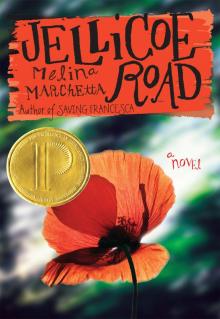 On the Jellicoe Road
On the Jellicoe Road The Piper's Son
The Piper's Son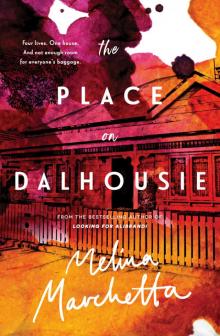 The Place on Dalhousie
The Place on Dalhousie Quintana of Charyn
Quintana of Charyn The Lumatere Chronicles: The Complete Trilogy
The Lumatere Chronicles: The Complete Trilogy What Zola Did on Tuesday
What Zola Did on Tuesday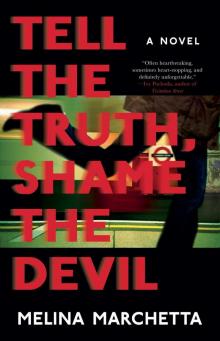 Tell the Truth, Shame the Devil
Tell the Truth, Shame the Devil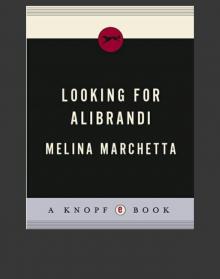 Looking for Alibrandi
Looking for Alibrandi What Zola Did on Monday
What Zola Did on Monday Froi of the Exiles lc-2
Froi of the Exiles lc-2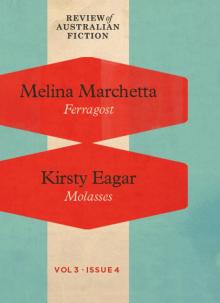 Review of Australian Fiction, Volume 3, Issue 4
Review of Australian Fiction, Volume 3, Issue 4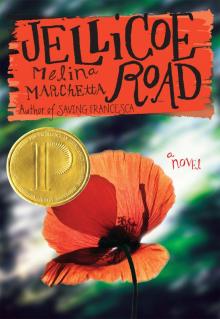 Jellicoe Road
Jellicoe Road Froi of the Exiles: The Lumatere Chronicles
Froi of the Exiles: The Lumatere Chronicles Quintana of Charyn lc-3
Quintana of Charyn lc-3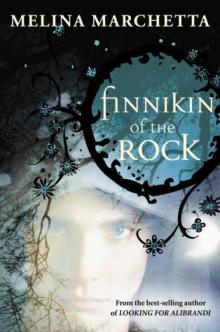 Finnikin of the Rock lc-1
Finnikin of the Rock lc-1 The Lumatere Chronicles
The Lumatere Chronicles